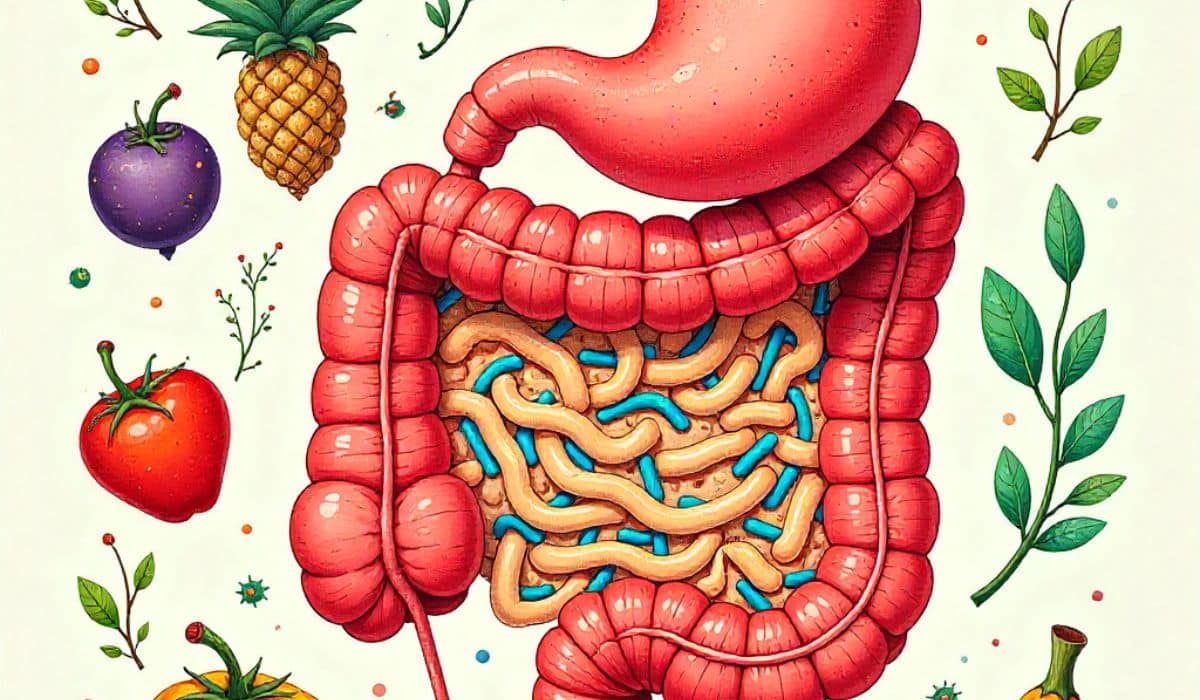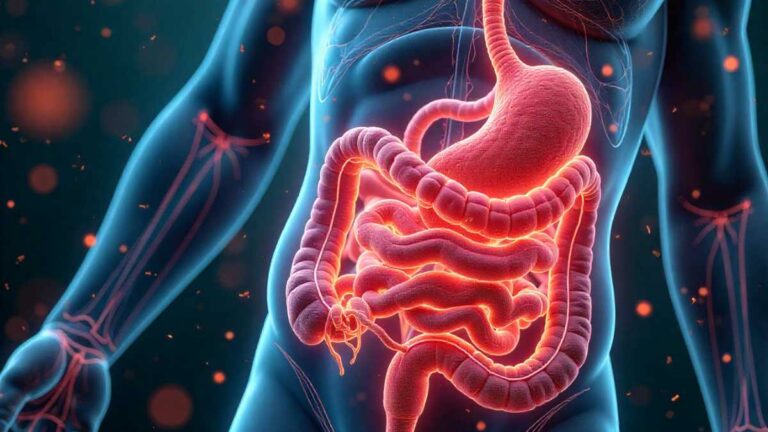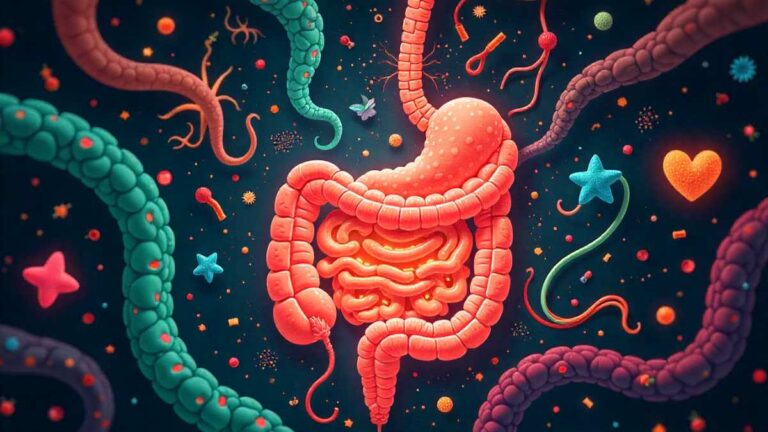10 Supplements That Support the Gut-Brain Axis For Wellness
Key Takeaways
- Learn about the intricate link between your gut and your brain.
- Discover ten beneficial supplements that can support this connection.
- Understand the science behind each supplement and how it works.
- Get practical tips on incorporating these supplements into your daily routine.
- Gain a deeper awareness of the gut-brain axis and its impact on overall wellness.
- Improve your mental and physical health.
Ever feel like your gut and your brain are in constant communication, maybe even arguing? One morning you wake up with a grumpy stomach, and suddenly, you’re feeling anxious about the day.
That’s the gut-brain axis at work! This incredible connection between your digestive system and your mind influences everything from your mood to your ability to focus.
Exploring the right nutrients can make a real difference. This article will help you support the gut-brain axis and experience improved mental clarity and gut health. You’ll gain practical knowledge about supplements that can help you feel better, inside and out.

The 10 Supplements That Support the Gut-Brain Axis
The gut-brain axis is a bi-directional communication pathway. This means your gut affects your brain, and your brain affects your gut.
It’s like a two-way street between your digestive system and your central nervous system. This pathway involves the vagus nerve (a major player), neurotransmitters (like serotonin), and the gut microbiome (the community of bacteria in your gut).
A balanced gut microbiome is vital for a healthy gut-brain axis. When things go off-kilter – maybe due to stress, poor diet, or certain medications – it can affect your mood, cognitive function, and even increase your risk of certain health conditions.
This is where supplements can help. They can provide essential nutrients to support the gut-brain axis and promote overall well-being. Getting enough of the right nutrients can help maintain a healthy gut and better mental health.
1. Probiotics for Gut Health
Probiotics are live microorganisms, mainly bacteria, that, when consumed, provide various health benefits.
Often found in fermented foods like yogurt and kimchi, or in supplement form, probiotics are crucial for maintaining a healthy gut microbiome.
They work by introducing beneficial bacteria to your gut, which can crowd out harmful bacteria, improving digestion and nutrient absorption.
Think of them as the friendly neighborhood protectors of your gut, keeping everything running smoothly.
Some studies suggest specific probiotic strains can positively impact the gut-brain axis. A balanced gut microbiome can influence mood and even reduce symptoms of anxiety and depression.
Probiotics also help strengthen your immune system because a lot of your immune system is in your gut. This can lead to less sickness.
How Probiotics Work
- Probiotics directly impact the gut microbiome, increasing the number of beneficial bacteria.
By introducing helpful microorganisms, probiotics displace and reduce the number of harmful bacteria. This leads to a healthier and more diverse gut microbiome, which is essential for overall health and well-being.
- Probiotics help with nutrient absorption.
Probiotics help break down foods and allow for easier absorption of nutrients. This ensures that you’re getting the most benefit from your food.
- Probiotics may have effects on mental health.
Some strains of probiotics produce neurotransmitters, such as serotonin, which are involved in mood regulation. They also assist in reducing inflammation throughout the body.
2. Prebiotics: Fueling the Good Bacteria
Prebiotics are non-digestible fibers that act as food for the probiotics (the good bacteria) in your gut. They essentially fuel the growth and activity of these beneficial bacteria.
Common prebiotics include inulin, fructooligosaccharides (FOS), and galactooligosaccharides (GOS). They’re found in foods like onions, garlic, bananas, and oats.
By consuming prebiotics, you can boost the effectiveness of probiotics and support a healthy gut microbiome.
Think of prebiotics as the fertilizer for your gut, helping your beneficial bacteria thrive. Without enough prebiotic fiber, your probiotics might struggle to survive and reproduce.
A thriving gut microbiome can improve mental health by positively influencing the gut-brain axis. This improves mood and cognitive functions.
Prebiotic Benefits
- Prebiotics feed the good bacteria.
Prebiotics are like food for the good bacteria in your gut. They promote the growth of these beneficial bacteria, improving overall gut health and potentially reducing gut-related issues like bloating and gas.
- Prebiotics aid in nutrient absorption.
By improving the environment in the gut, prebiotics can help improve nutrient absorption. This ensures your body receives essential vitamins and minerals.
- Prebiotics are found in many foods.
Prebiotics are naturally found in a variety of plant-based foods, making them easy to incorporate into your diet. Some examples include onions, garlic, and bananas.
3. L-Glutamine: Repairing and Protecting the Gut Lining
L-Glutamine is an amino acid that plays a vital role in repairing and maintaining the gut lining. It’s the primary fuel source for the cells lining your intestines.
This means it helps to keep the gut lining healthy and functioning correctly. A leaky gut can cause inflammation and other issues that can impact the gut-brain axis.
Supplementing with L-glutamine can help strengthen the gut barrier, reducing inflammation and supporting overall gut health.
Consider it a building block for your gut, ensuring it remains strong and resilient. L-glutamine is often used in conditions where the gut lining might be compromised, such as during times of stress or with certain medical conditions. Studies suggest L-glutamine can decrease anxiety. It helps regulate the stress response.
How L-Glutamine Supports the Gut
- L-Glutamine fuels gut cells.
It is the primary source of energy for the cells that line your intestines. This helps maintain the structure and function of the gut lining.
- L-Glutamine helps repair the gut.
It helps in repairing damaged gut lining by supporting the growth and repair of cells. This is particularly important if you have a condition known as “leaky gut.”
- L-Glutamine assists in reducing gut inflammation.
It has anti-inflammatory properties, which can help to soothe the gut and protect it from further damage. This can improve the link between the gut and the brain.
4. Omega-3 Fatty Acids: Nourishing the Brain
Omega-3 fatty acids, particularly EPA (eicosapentaenoic acid) and DHA (docosahexaenoic acid), are crucial for brain health.
They are major structural components of brain cells and play a key role in brain function. Omega-3s have been shown to reduce inflammation, which can affect both the gut and the brain.
You can get Omega-3s from fatty fish, flaxseeds, and supplements. They can also support the communication between the gut and brain.
Think of them as essential nutrients that keep your brain healthy. DHA is very important for the structure of the brain.
Low levels of Omega-3s have been linked to an increased risk of anxiety and depression. Some studies suggest Omega-3s can improve mood.
Omega-3s: Benefits for the Gut-Brain Axis
- Omega-3s reduce inflammation.
Omega-3s have strong anti-inflammatory properties, which help to reduce inflammation in the gut and brain. Chronic inflammation in either area can negatively impact the gut-brain axis.
- Omega-3s support brain structure.
DHA, one of the primary omega-3 fatty acids, is a key component of brain cell membranes. Proper levels of DHA are essential for maintaining brain structure and function.
- Omega-3s can improve mood and cognitive function.
Studies show that omega-3 supplementation may assist in improving mood and cognitive function. This is because it helps reduce inflammation, which can impair brain function.
5. Vitamin D: Mood and Gut Health Support
Vitamin D, often called the “sunshine vitamin,” is essential for overall health, including mood regulation and gut health.
Vitamin D receptors are found throughout the body, including the gut and the brain. It plays a role in reducing inflammation. Vitamin D deficiency is common.
Studies suggest that supplementation can improve mood and cognitive function. Vitamin D is essential for immune function, which is closely linked to gut health.
A healthy gut and a balanced mood are often interconnected. Consider Vitamin D as a key player in promoting overall wellness. It can also help the good bacteria in your gut thrive. It impacts the brain and mood.
How Vitamin D Affects the Gut-Brain Axis
- Vitamin D reduces inflammation in the gut.
By reducing inflammation, Vitamin D helps to maintain a healthy gut environment. This helps the gut-brain axis work effectively.
- Vitamin D assists with mood regulation.
Vitamin D receptors are located in areas of the brain that affect mood. It may help with mood regulation and symptoms of depression and anxiety.
- Vitamin D assists with immune system support.
A strong immune system is important for a healthy gut microbiome. Vitamin D helps keep the immune system strong and supports the balance of beneficial bacteria.
6. Zinc: Supporting Gut and Brain Function
Zinc is a mineral that plays a vital role in numerous bodily functions, including immune function, gut health, and brain function. It acts as an antioxidant.
Zinc deficiency can affect both the gut and the brain. Zinc supplementation can help with gut health by supporting the gut lining and reducing inflammation.
It also helps in the production of neurotransmitters that are essential for mood regulation. Zinc supports overall well-being.
Think of zinc as a helper that supports gut health. It also impacts brain function. It can improve your mood. Studies show that people with lower levels of zinc often report feeling more anxious.
Zinc’s Role in the Gut-Brain Axis
- Zinc promotes a healthy gut lining.
Zinc is essential for maintaining the structure and integrity of the gut lining, which helps prevent a leaky gut. This helps with the link between your gut and brain.
- Zinc can reduce inflammation.
Zinc has antioxidant properties, which can help reduce inflammation in the gut and brain. This is good for both systems.
- Zinc assists in neurotransmitter production.
Zinc is necessary for the production of neurotransmitters, such as serotonin, which play an important part in mood regulation. The right levels of zinc can have a positive impact on both gut and brain function.
7. Magnesium: For Stress and Sleep
Magnesium is a mineral involved in over 300 biochemical reactions in the body. It plays a key role in reducing stress and promoting better sleep, both of which can positively influence the gut-brain axis.
Stress and lack of sleep can negatively impact gut health, so magnesium can help by reducing these negative effects.
Magnesium helps regulate the stress response by activating the parasympathetic nervous system (the “rest and digest” system). Adequate magnesium intake is associated with reduced anxiety and improved sleep quality, contributing to a healthier gut-brain connection.
Magnesium is good for mood regulation. It also helps the brain and gut communicate efficiently. It helps regulate sleep and reduces stress.
Magnesium and the Gut-Brain Axis
- Magnesium helps manage stress.
It helps regulate the nervous system and can calm the body’s stress response. This can reduce stress and protect gut health.
- Magnesium can improve sleep quality.
Good sleep is essential for overall health, including a healthy gut-brain axis. Magnesium can improve sleep quality, helping the gut and brain.
- Magnesium plays a key role in mood regulation.
Magnesium is involved in the regulation of neurotransmitters, and its use is connected to improved mood and decreased anxiety. Getting enough magnesium can promote better sleep and mood.
8. Curcumin: A Natural Anti-Inflammatory
Curcumin is the active compound found in turmeric, a spice often used in Indian cuisine. Curcumin has powerful anti-inflammatory and antioxidant properties.
Inflammation is a key factor in many health problems. It can damage both the gut and the brain. It can impact the gut-brain axis.
Supplementing with curcumin can help reduce inflammation, which can improve gut health and cognitive function.
Consider curcumin as a natural way to reduce inflammation. It can help protect your brain. Curcumin can cross the blood-brain barrier, reaching the brain and reducing inflammation.
This can reduce mood-related disorders. Some studies show that curcumin can help reduce symptoms of depression.
Curcumin’s Effects on the Gut-Brain Axis
- Curcumin has strong anti-inflammatory properties.
By reducing inflammation, curcumin can protect the gut and brain from damage. It can improve the link between your gut and brain.
- Curcumin supports brain health.
It can cross the blood-brain barrier, which helps protect the brain from damage and promote cognitive function. This is good for your mental health.
- Curcumin has antioxidant properties.
Curcumin protects cells from damage caused by free radicals. This can improve the health of both the gut and the brain.
9. S-Adenosylmethionine (SAMe): For Mood Support
S-Adenosylmethionine (SAMe) is a compound that occurs naturally in the body and plays a role in many biochemical reactions.
It’s involved in the production of neurotransmitters like serotonin, dopamine, and norepinephrine, which are essential for mood regulation.
Supplementing with SAMe has been shown to improve mood and reduce symptoms of depression.
SAMe is also thought to have anti-inflammatory properties. It can support liver health. Think of SAMe as a mood booster.
It works by influencing neurotransmitter levels. It’s important to speak with your healthcare provider before beginning any new supplement regimen. SAMe is often studied as a natural treatment for mood disorders.
SAMe and the Gut-Brain Axis
- SAMe impacts neurotransmitters.
It is involved in the production of neurotransmitters that affect mood. Taking SAMe may improve mood.
- SAMe has anti-inflammatory properties.
It reduces inflammation throughout the body, including in the gut and brain. This helps the gut-brain axis.
- SAMe may support liver function.
A healthy liver can positively influence gut health. SAMe can improve mood and mental well-being.
10. Berberine: Gut and Metabolic Health
Berberine is a compound found in several plants that has been used in traditional medicine for many years. It has been found to have positive effects on gut health.
Berberine has anti-inflammatory and antioxidant effects and can help improve gut health and the balance of bacteria in the gut.
Berberine also helps regulate blood sugar levels. Because metabolic health is closely connected to the gut-brain axis, berberine’s effects on metabolic health can have positive effects on mood and cognitive function.
Think of berberine as a multi-tasker that can support your gut and overall health. It is often used to assist in blood sugar regulation. It may have effects on brain function.
How Berberine Impacts the Gut-Brain Axis
- Berberine has positive effects on the gut microbiome.
It supports a healthy balance of bacteria in the gut. This promotes good gut health.
- Berberine reduces inflammation.
It has anti-inflammatory properties, which can improve both gut and brain health. This promotes better gut-brain communication.
- Berberine aids in blood sugar regulation.
By improving metabolic health, berberine also promotes healthy gut function. This can have a positive effect on mood.
FAQ Of 10 Supplements That Support the Gut-Brain Axis For Wellness
Can supplements completely fix problems with the gut-brain axis?
Supplements can be a helpful tool, but they are most effective when combined with a healthy diet, regular exercise, and stress management techniques.
Are there side effects associated with taking these supplements?
It varies by supplement, but some might cause mild digestive upset. It’s best to start with a low dose and consult with your doctor.
How long does it take to see results from these supplements?
Results vary. Some people may notice changes in a few weeks, while others might need several months. Be patient and consistent.
Can I take all of these supplements together?
While many supplements can be taken together, consult with a healthcare professional before starting any new regimen. They can give specific guidance.
Are these supplements safe for children and pregnant women?
Generally, it is not recommended to administer supplements to children and pregnant women. However, it’s best to consult with a doctor before taking any supplements if you are pregnant or have children.
Final Thoughts
Supporting the gut-brain axis through supplementation can be a powerful strategy for improving both mental and physical health.
The 10 supplements discussed here – probiotics, prebiotics, L-glutamine, omega-3 fatty acids, vitamin D, zinc, magnesium, curcumin, SAMe, and berberine – each offer unique benefits that contribute to this critical connection.
They can help with mood regulation, reducing inflammation, and supporting optimal gut health. Remember, it’s always wise to consult with a healthcare professional before beginning any new supplement regimen to ensure it aligns with your individual needs and health conditions.
Start slowly, be consistent, and listen to your body. By taking the right steps, you can cultivate a healthier gut, a clearer mind, and experience a greater sense of well-being. You can live a healthier life by supporting your gut-brain axis.


![Gut Friendly Meal Plan for Busy Professionals Eat Well, Feel Great[1]](https://mycleanseplan.com/wp-content/uploads/2025/11/Gut-Friendly_Meal_Plan_for_Busy_Professionals__Eat_Well_Feel_Great1-768x448.jpg)

![Plant Based Diets and Gut Health What Recent Trials Show[1]](https://mycleanseplan.com/wp-content/uploads/2025/10/Plant-Based_Diets_and_Gut_Health_What_Recent_Trials_Show1-768x448.jpg)
![Gut Microbiome & Depression New Research Insights Revealed[2]](https://mycleanseplan.com/wp-content/uploads/2025/10/Gut_Microbiome__Depression__New_Research_Insights_Revealed2-768x448.jpg)
![Celebrity Gut Health Stories — Exploring Common Misconceptions[1]](https://mycleanseplan.com/wp-content/uploads/2025/11/Celebrity_Gut_Health_Stories_—_Exploring_Common_Misconceptions1-768x448.jpg)